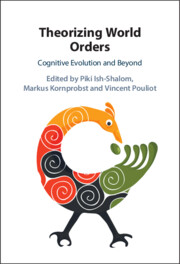Book contents
- Theorizing World Orders
- Theorizing World Orders
- Copyright page
- Dedication
- Contents
- Tables
- Preface
- Note on the Cover Image
- 1 Cognitive Evolution and World Ordering
- 2 Power in Communitarian Evolution
- 3 In Consideration of Evolving Matters
- 4 The Phenomenology of Cognitive Evolution
- 5 Narratives in Cognitive Evolution
- 6 Cognitive Evolution and the Social Construction of Complexity
- 7 Refugees and Their Allies as Agents of Progress
- 8 Holding the Middle Ground
- 9 Conclusion
- References
3 - In Consideration of Evolving Matters
A New Materialist Addition to Emanuel Adler’s Cognitive Evolution
Published online by Cambridge University Press: 18 November 2021
- Theorizing World Orders
- Theorizing World Orders
- Copyright page
- Dedication
- Contents
- Tables
- Preface
- Note on the Cover Image
- 1 Cognitive Evolution and World Ordering
- 2 Power in Communitarian Evolution
- 3 In Consideration of Evolving Matters
- 4 The Phenomenology of Cognitive Evolution
- 5 Narratives in Cognitive Evolution
- 6 Cognitive Evolution and the Social Construction of Complexity
- 7 Refugees and Their Allies as Agents of Progress
- 8 Holding the Middle Ground
- 9 Conclusion
- References
Summary
The paper enriches New Materialism with a macro-historical theorization of changes of international order. It finds inspiration in Emanuel Adler’s cognitive evolution, and complements this theoretical framework with a New Materialist dimension. Following cognitive evolution international orders change when the configuration of international practices, their background knowledge and the practitioners change. The two steps that are crucial for these changes are creative variation and selective retention. Technologies and artefacts play a key role in the variation and retention of international practices. New Materialist mechanisms of creative variation focus on forbidden fruit blending (the combination of material objects from realms that do not typically belong together to create a new device), on the intertwinements between new ideas and new technologies and artefacts, and on the entanglements between new practices and new artefacts and technologies. In terms of selective, retention I argue that functionality and aesthetics can operate as material criteria for selective retention, and I highlight the relevance of network memory for the kinds of information that are stored and how they can be stored, thus retained. The paper illustrates the usefulness of a New Materialist version of cognitive evolution on the evolution of the internet as a specific international order.
Information
- Type
- Chapter
- Information
- Theorizing World OrdersCognitive Evolution and Beyond, pp. 53 - 80Publisher: Cambridge University PressPrint publication year: 2021
